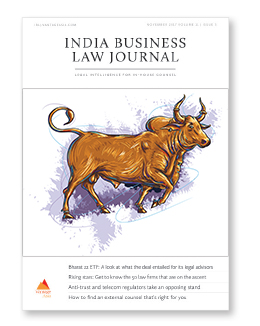Foretelling what lies ahead for India is a risky business.
With so much about India being a mix of the good and the not-so-good, it is only inevitable that stories of the country’s impressive achievements and resilience coexist alongside those of the considerable challenges. So when Moody’s recently upgraded India’s sovereign rating – citing continued progress on economic and institutional reforms – it was almost on cue that reports emerged about Nissan suing the government for what it says is US$770 million in unpaid incentives. Testament once again to the fact that the opportunities that present themselves in India are vast, but so are the trials and tribulations.

Be that as it may, investor sentiment in India’s equity markets is at a record high. The past few months have seen a boom in initial public offerings (IPOs) with insurance companies leading the charge. As we detail in this issue’s Cover story the ability of the insurance companies to opt for IPOs can be traced back to recent regulatory changes brought about by both parliament and the insurance sector regulator.
In addition, appetite for securities as an asset class may be on the rise following India’s tryst with demonetization, the implementation of a country-wide goods and services tax and the setting up of a real estate regulator. This ability to look beyond the traditional investment classes of gold and real estate bodes well for capital markets. But in order for companies to make the most of the IPO boom, the differences in procedures prescribed by the multiple regulators involved will need to be ironed out. Lokanath Kar, chief legal and principal compliance officer at ICICI Lombard GIC suggests a single window for dealing with IPO related issues and a timely approval mechanism, which he says “will definitely smooth out the entire listing process and enable greater transparency at the outset.”
A lack of certainty on account of the existence of multiple regulators is a particular problem in India also with regards to antitrust matters. In Turf wars we analyse how an overlapping scope of authority bestowed on the Competition Commission of India, and the telecom sector regulator has resulted in various contrary positions – not least to do with predatory pricing. This has triggered confusion about who should deal with competition-related matters. With no solution in sight, parameters such as the much-watched “ease of doing business” could be impacted.
This month’s What’s the deal zeroes in on a new fund, Bharat 22 ETF, which is being hailed as the largest new fund offer in the history of India’s mutual fund industry. Crucially, it has provided a valuable shot in the arm for the government’s disinvestment programme. This is the government’s second all-equity exchange traded fund and legal advisers involved speak of the transaction providing valuable experience. Reports of the government looking to list Bharat 22 ETF internationally is surely testament to a job well done by all involved.
In the second part of a special series on technology in the legal sector (Repelling the web pirates), we examine how governments across Asia are updating cybersecurity and data protection laws in anticipation of future cyber-attacks. Rules and regulations on cybersecurity are expected to have a significant impact on businesses wanting to insure themselves against risks involved with the internet of things, big data and mobile payments. As law firms emerge as targets, the international Association of Corporate Counsel guidelines on data security set out in-house expectations of external lawyers who have access to sensitive company data.
Writing in this issue’s Vantage point Kiran Radhakrishnan, legal counsel for India and South Asia at Diversey, makes the point that identifying the right external counsel requires time and a great deal of savvy. He cautions that while every business needs external legal advice and representation, it can either end up as a lavish line item or as one of the cornerstones of a company’s success.
This issue’s Intelligence report reveals the winners of India Business Law Journal’s inaugural Rising Stars of India’s legal profession award. We honour 50 law firms that we believe are on the ascent and well on their way to becoming recognized as leading providers of advice and representation. While some such as Argus Partners and IC Universal Legal are large, many others including firms such as Lawyers at Work are small. And whether they are of recent vintage or they have been around for a while, we see each one exhibiting traits that will see them shining even more brightly in the near future.
The 50 firms were identified after an extensive consultation exercise involving in-house counsel. We believe these are united by their potential and deserve to be on the radar of every discerning client.


























